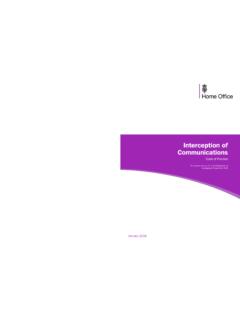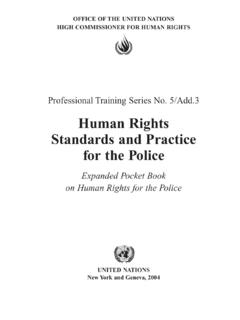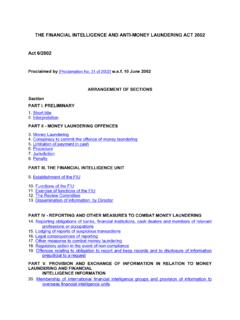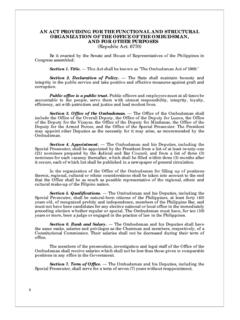Transcription of Guide to the Regulation of Surveillance - GOV.UK
1 Guide to the Regulation of Surveillance A shared approach to the Regulation of Surveillance in the United Kingdom. Contents 1. Introduction 2. Surveillance legislation 3. Roles and functions of Surveillance bodies This guidance has been drawn up by the Commissioners whose work it describes to explain their roles and responsibilities in relation to Surveillance matters. The document will be updated periodically. Published February 2019 by the Surveillance Camera Commissioner s Office. This guidance will be kept under regular review. Introduction The purpose of this guidance is to clarify the roles and responsibilities of the bodies involved in overseeing legislation concerning Surveillance in the United Kingdom and provide an overview of who is responsible for what.
2 It is designed to ensure that respective roles are understood and that the privacy of individuals is considered alongside the development and deployment of Surveillance camera systems. The legislation referred to in this guidance and the associated codes of practice all sit under the umbrella of the European Convention on Human Rights (ECHR) and the Human Rights Act 1998 (HRA). The bodies involved in regulating Surveillance must seek to ensure that any Surveillance carried out by public authorities does not interfere with the individual rights set out in the ECHR, whilst also ensuring that their own decisions are compliant with Human Rights legislation.
3 The arrangements outlined in this document help to ensure that where overlaps exist responsibilities are clear and there are no areas that are neglected. This guidance is primarily aimed at members of the public, but is also designed to facilitate an understanding between the bodies involved in the Regulation of Surveillance for their own use. The Regulation of Surveillance is a complex area. This document does not aim to be exhaustive. There are bodies that are not mentioned that have responsibilities for overseeing or advising on legislation referred to within this document. These include the Equality and Human Rights Commission and the Northern Ireland Human Rights Commission who have statutory remits to promote and monitor human rights.
4 This document shows the relationship and overlaps between different pieces of legislation, including the Regulation of investigatory Powers Act 2000 (RIPA), the General Data Protection Regulation (GDPR), the Data Protection Act 2018 (DPA) and the Protection of Freedoms Act 2012 (PoFA). Surveillance legislation European Convention on Human Rights (ECHR) The ECHR sets out the fundamental rights and freedoms that signatory governments must secure to everyone within their jurisdiction. Article 8 provides a right to respect for an individual s private and family life, home and correspondence. Intelligence Services Act 1994 (ISA) The ISA makes provisions for the issue of warrants and authorisations enabling certain actions to be taken by the Intelligence Services in relation to interference with property and wireless telegraphy.
5 Part III Police Act 1997 Part III Police Act 1997 outlines the requirements for the consideration and authorisation of interference in respect of property and wireless telegraphy. Human Rights Act 1998 (HRA) The HRA gives further legal effect in the UK to the fundamental rights and freedoms contained in the ECHR. Its effect is that all public bodies such as police and local governments, and other bodies carrying out public functions, have to comply with an individual s ECHR rights. Among other things it also means that individuals can take human rights cases to domestic courts rather than having to take their case in the European Court of Human Rights.
6 Regulation of investigatory Powers Act 2000 (RIPA) RIPA provides the regulatory framework for determining whether a range of covert investigatory techniques by public authorities is proportionate and necessary in compliance with Article 8 of the ECHR. Regulation of investigatory Powers (Scotland) Act 2000 (RIPSA) RIPSA provides the regulatory framework in Scotland for determining whether covert Surveillance and the use of covert human intelligence sources by public authorities acting on devolved matters, is proportionate and necessary in compliance with Article 8 of the ECHR. Protection of Freedoms Act 2012 (PoFA) The PoFA introduces a code of practice for Surveillance camera systems, the appointment of Surveillance Camera and Biometrics Commissioners and provides for judicial approval of certain Surveillance activities by local authorities.
7 Data Protection Act 2018 (DPA) The DPA regulates the processing of personal data. It provides seven principles of good information handling with which organisations must comply and provides individuals with rights with respect to the processing of their personal data. General Data Protection Regulation (GDPR) The GDPR is a Europe-wide law that applies to the use of personal information which means any information relating to an identifiable person who can be directly or indirectly identified, in particular by reference to an identifier. The GDPR sets out requirements for how organisations need to handle personal data from 25 May 2018.
8 investigatory Powers Commissioner s Office (IPCO) Lead Sir Adrian Fulford Description of regulatory role The investigatory Powers Commissioner, Lord Justice Fulford, and his Judicial Commissioners are responsible for overseeing the use of investigatory powers by public authorities. This includes law enforcement, the intelligence agencies, prisons, local authorities and other government agencies ( regulators). In total over 600 public authorities and institutions can make use of investigatory powers. The Commissioners are supported in this work by a small team of civil servants the investigatory Powers Commissioner s Office (IPCO).
9 The more intrusive powers such as interception, equipment interference and the use of Surveillance in sensitive environments are subject to the prior approval of both a Secretary of State and a Judicial Commissioner. Use of these and other Surveillance powers, including the acquisition of communications data and the use of covert human intelligence sources, are also subject to a programme of retrospective inspection and audit by Judicial Commissioners and IPCO s inspectors. Description of regulatory remit regarding Surveillance IPCO provides independent oversight of the use of investigatory powers by intelligence agencies, police forces and other public authorities.
10 Relevant legislation regulated by this body investigatory Powers (IP) Act 2000 The Regulation of investigatory Powers Act 2000 (RIPA) Regulation of investigatory Powers (Scotland) Act 2000 Security Services Act (1996) Data Retention and investigatory Powers Act (DRIPA) Police Act 1997 The Intelligence Services Act (1994) Key roles / powers relevant to Surveillance IPCO performs the double lock function of providing Judicial Commissioner approval of the more intrusive powers such as interception, equipment interference and Surveillance in sensitive environments. IPCO is also responsible for overseeing the use of: Covert Surveillance by designated public authorities based in the UK, and by the Police and Customs operating within the Sovereign Base Areas of Cyprus.
















